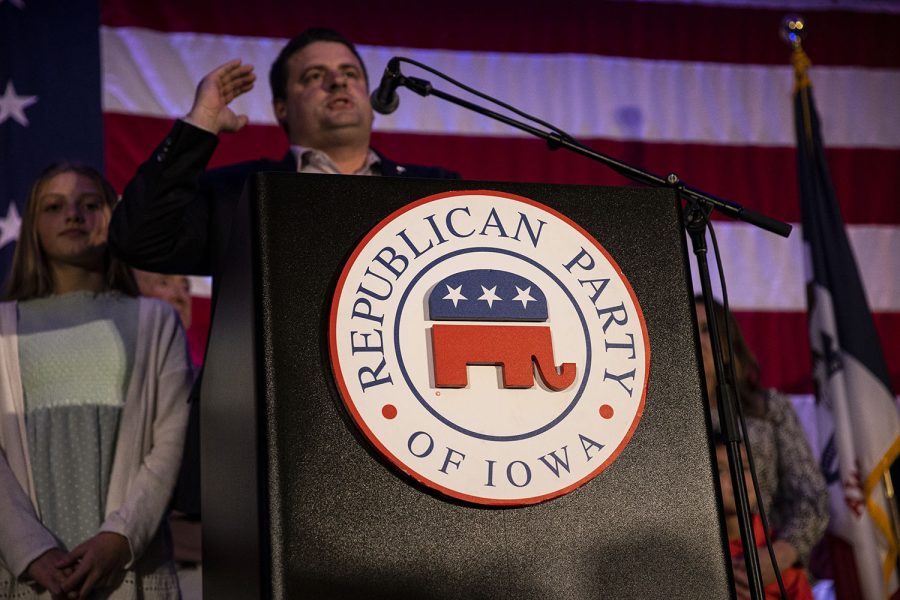Republicans prepare for upcoming legislative session
With a red wave hitting Iowa to some it seems like Republicans might be dominating the state. However, independent voters still make up about a third of the state’s voter registration.
Iowa House Speaker Pat Grassley speaks during a watch party for Iowa Republicans on Election Day at the Hilton Downtown in Des Moines on Tuesday, Nov. 8, 2022.
December 6, 2022
With Republicans holding the trifecta of power in Iowa, the party has a hefty mandate to enact a conservative agenda during the upcoming legislative session. Democrats, however, are planning to go against the supermajority.
Republicans shored up a “red wave” in Iowa on Nov. 8, gaining ground in the state legislature, eight seats in the Iowa House, and two in the Iowa Senate. The GOP also won control of five of six statewide administrative offices, defeating two long-term Democratic incumbents and controlling all six seats of Iowa’s Congressional delegation.
This has led to many wondering whether Iowa is now a red state and how the next legislative session will go.
In a statement after the election, Senate Majority Leader Jack Whitver, R-Des Moines, said the results showed Iowans are rejecting the way of “D.C. liberals.”
“Iowans spoke clearly,” Whitver said. “They want common-sense solutions to the problems we’re facing,” Whitver said.
Whitver pointed to the Republicans’ agenda as the key to their success in the election, looking to enact even wider tax breaks after passing a flat tax rate of 3.9 percent in the last legislative session that will take full effect by 2026.
“Once again, they have validated our agenda and our message to focus on growth and prosperity for Iowa families,” Whitver said. “We will continue to be focused on tax relief, supporting law enforcement, fighting reckless spending, and empowering parents.” Whitver said.
In the last legislative session, Republicans — led by Gov. Kim Reynolds — aimed to provide scholarships for public school students wishing to attend private schools. With Democrats and some Republicans opposed to the legislation, it failed to pass the Iowa House. During the primary season, Reynolds advocated against Republicans that didn’t support her plan, which helped oust those incumbents in primary challenges.
Speaker of the Iowa House Pat Grassley, R-New Hartford, established an education reform committee, which he will chair with House Majority Leader Matt Windschitl as his vice chair. The committee’s charter is to tackle significant reforms to Iowa’s public education system.
With a large lead in the House and Senate, Iowa Republicans are likely to pass school voucher bills in the next legislative session.
Democrats are looking to continue to fight for their values even with dwindling power in the statehouse. House Minority Leader Jennifer Konfrst, D-Windsor Heights, said House Democrats are looking to legalize marijuana and protect reproductive rights — among other goals — despite their minority in the legislature.
“While the election results were tough this year, we understand Iowans are fed up with politics, and we’re going to stay focused on the issues important to them,” Konfrst said in a statement.
Senate Minority Leader Zach Wahls, D-Coralville, said Senate Democrats are looking to fight against the Republican supermajority.
“As Iowans face high prices, slow growth, and rising uncertainty, Senate Democrats are committed to defending economic opportunity and fundamental rights,” Wahls said in a statement. “Republican politicians, meanwhile, are offering the same old extreme and unfair agenda rewarding big corporations over middle-class families and attacking Iowans’ personal freedom.”
The Iowa legislative session opens on Jan. 9, 2023, in the statehouse in Des Moines.
Independent voters could change future of the “red wave”
Professor Timothy Hagle, an associate professor of political science at the University of Iowa, said independent voters are a deciding factor in Iowa’s elections, making up one-third of the active registered voters in the state.
Infographic by Liam Halawith/ The Daily Iowan
“So, it’s all those folks in the middle, and right now they tend to be leaning towards the Republican side of things,” Hagle said.
Hagle said he thinks Iowa is still a purple state given that independent voters make up a large part of the voting block.
“I would still say that Iowa is a purple state, but it is a little bit leaning on the red side of purple at this point,” Hagle said.



